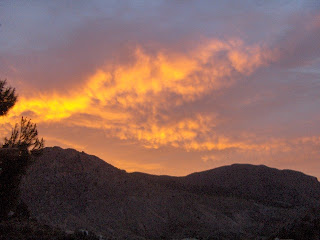I had the early shift with the dogs today, and I was so glad I did. The pink and white almond blossom both scented and tinted the land, and the sun’s red ball slowly rose from the Mediterranean, but I ended this walk feeling so really angry and guilty too!
My phone had rung as I was nearly back at the casa. It was Pape Sec, my very good Senegalese market trader friend. He was distraught. He was about to set off this morning, to go to market, when he discovered that his battered old van had been broken into, and that his entire stock of handbags had been stolen.
Let me tell you a little about Pape. He’s been in Spain for about 5 years now. He arrived from Senegal on a flight from Dacca to Madrid, and entered the country on a legal visa, which had cost him and his family, what was for them a fortune. They had saved for several years, to raise this. The investment in Pape, was an investment for all the family. Prospects for him to earn any kind of income in Senegal were so poor that the sacrifice of not seeing his family – his mother, wife and two young children for several years (5 years so far) was worth it. The legal visa provided for only one visit. A few of his friends, who arrived here several years ago, now have all the necessary paperwork, and are able to travel back to Senegal by car, and then legally return. When they do, Pape is able to send his family all kinds of small gifts – soap, hand cream, candles, paper and pencils not readily available or affordable there. He has also been able to send money, sometimes 10 Euros, sometimes 20 Euros that have really helped the quality of life of his immediate family, and repay the debt of the visa.
Pape’s dream is that one day he will be able to legally return to Senegal, to see his wife, children and ageing mother. His brother died about 6 months ago. A return to the funeral wasn’t an option! He does accept though that the best he can hope for in life is to be a migrant worker, living far from home, seeing his family just occasionally, but at least able to provide them with a life above subsistence level.
To become legal in Spain, Pape has to fulfil several criteria. He has to be able to prove he has lived here for 3 years. He has to show that he has significant funds in the bank. He also has to show that he is making contributions to the Spanish National Insurance system, either as a self employed person (305 Euros per month and not many traders of any nationality can afford to pay this) or by being an employee of a company. Unemployment in Spain since ‘El Crisis’ (the international financial meltdown), is running well above 20%, so there is virtually no chance of gaining employment other than by occasional ‘unofficial’ agricultural labour. Apparently, it is possible to purchase a ‘contracto’ – paperwork from an ‘employer’ to show that national insurance contributions are being paid by them – but many of these are simply schemes to rip off poor and desperate people.
So in reality, it seems Pape must struggle on. He lives in a flat only intended for two people, but ‘hot bedding’ with 5 others! He must hope that the world wide recession will come to an end soon so that he can get any kind of a wage paying job, or that he can maybe sell just a few more handbags each week for 12 Euros – that he paid 5 Euros for – after travelling 2hours each way to the wholesaler in Elche, at a cost of 40 Euros of diesel – to purchase them!
And so I feel guilty that my life is relatively uncomplicated. By and large I can afford the ‘necessities’ of life and then some! If I need to return to see family in the UK, I can be there next day – if not sooner. However, my mate Pape lives on the edge of economic and emotional survival. He strives under the most difficult circumstances to do his best for the family who he has not seen for years, and has little prospect of doing so soon, so that they can have a marginally better life.
And then some ‘low life’ steals his means of survival from him. The handbags they took represent Pape’s very struggling business. Even at the good markets Pape sells very few or even no bags these days, because local people, understandably, are hanging onto their money. The ‘low life’ is probably struggling to survive just like Pape – but that doesn’t stop getting me so angry, that they would harm someone so vulnerable.




























